September Policy Updates: Election Resources, FY25 Appropriations, Legal Developments, and More!
️💵 Area Budget Formulation on the Horizon: Your engagement in the FY27 Budget Formulation Cycle is crucial.
🗳️ Election 2024: State-specific graphics now available to boost voter participation in the 2024 election.
💰 Appropriations Update: Updates on FY25 funding and the potential for a Continuing Resolution to prevent a government shutdown.
📝 Federal Comments: Review NCUIH’s recent recommendations to federal agencies on Medicaid, HIT Modernization, and syphilis outbreak response. Share your input on the USDA Dietary Guidelines by October 1.
🏛 Legislative Updates: Updates on FMAP, SDPI reauthorization, Telehealth Modernization Act, and BADGES for Native Communities Act.
🔙 ICYMI: Stay informed with the latest Dear Tribal Leader Letters and Federal Tribal Advisory Committee Meetings
🚀 NCUIH in Action: Highlights from the VAWA celebration at the White House with President Biden, National Voter Registration Day at Native Health Phoenix and, and engagement with Members of Congress.
📅 Important Dates: Mark your calendars for upcoming meetings and events.
⚖ Legal Update: Monitoring the Becerra v. San Carlos Apache case as IHS develops new contract support costs methodology.
On the Horizon: Area Budget Formulation – Your Engagement Matters!
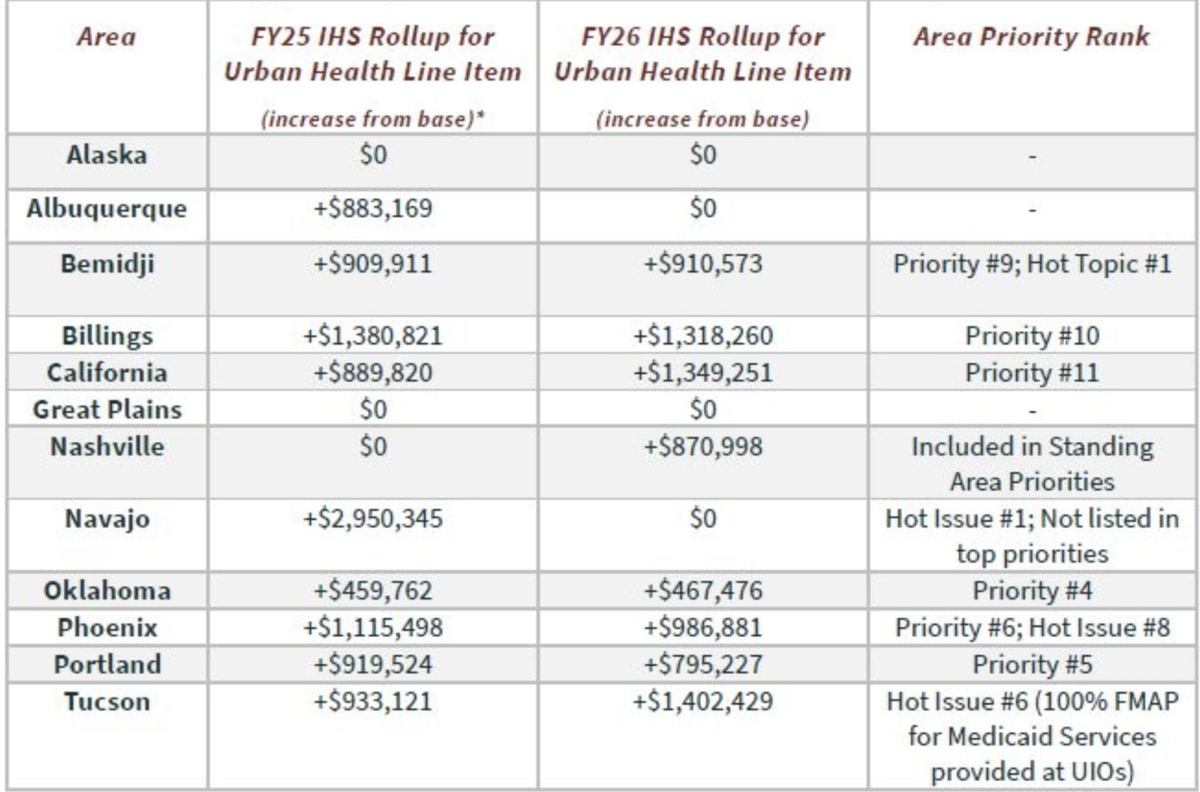
IHS is beginning the FY27 Budget Formulation Cycle and UIOs are invited by their Area Offices to participate in this important opportunity to impact the budget recommendations for your area.
- Why is UIO engagement important?: UIO input in Area Budget Formulation meetings can drastically influence budget requests for the urban line item and priority areas.
- Go Deeper: It is critically important that UIOs attend their Area Budget Formulation meeting and advocate for additional support for urban Native communities.
- Last Year: A number of areas prioritized funds for the Urban line item to help UIOs as seen in the chart above.
- Date Anticipation: FY 2026 Area Budget Consultations set to begin in October, 2024
Empowering Native Votes: State-Specific Graphics Now Available for UIOs
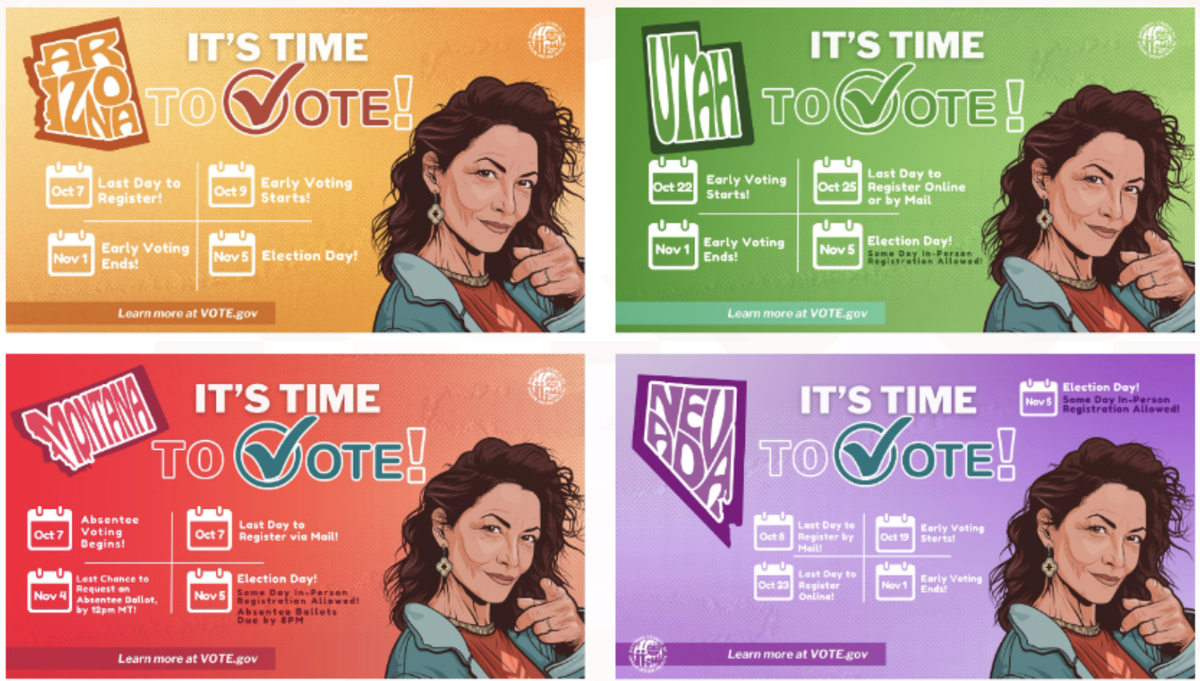
Introducing the new Urban Voices Amplified: Empowering Native Votes Toolkit, developed by the NCUIH with support from the National Urban Indian Family Coalition. This resource is designed to provide Urban Indian Organizations with crucial voter information, helping American Indian and Alaska Native communities stay informed about important deadlines for the 2024 election.
Toolkit Highlights:
- State-specific graphics, including key voter registration deadlines and election dates.
- Resources to help individuals register or update their voter information.
Access the Toolkit: Download the Toolkit and share it with your community to support voter participation.
Appropriations Updates
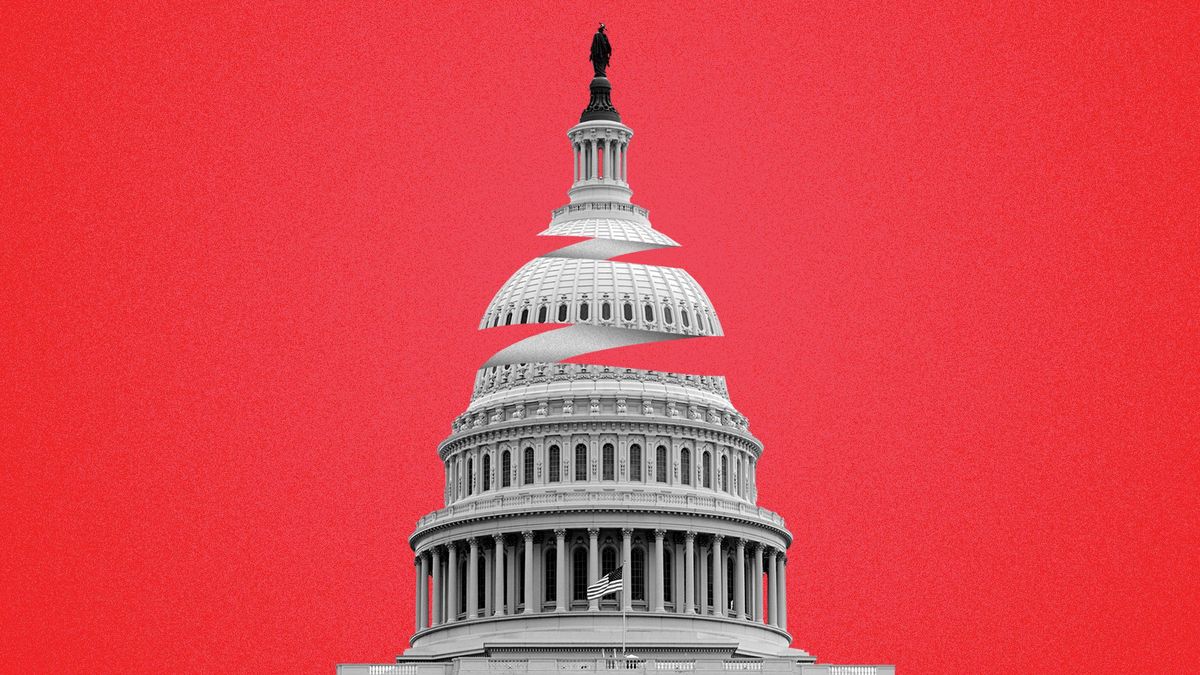
Fiscal Year 2025:
On Wednesday, September 25, Congress passed a Continuing Resolution, or short-term government funding bill, which would fund the government until Dec. 20, and prevent a government shutdown.
- The bill does not include the controversial SAVE Act, a GOP measure that requires voters to show proof of citizenship.
FY 2025 Funding for Veterans:
On Thursday, September 19, 2024, Congress passed supplemental funding bill (HR 9468) to address the close to $3 billion budget shortfall for Veteran’s benefits.
- This funding ensures that all veterans will continue to receive their pension and benefits without lapse.
- There are no Native specific programs in this bill.
Take Action to Support Mandatory Funding for IHS CSCs and 105(l) leases:
NCUIH sent out an action alert urging advocates to contact Congress to support mandatory funding for IHS Contract Support Costs (CSCs) and 105(l) lease funding.
- Ways to advocate: Call or email your Representative, and post on social media using the template language provided in the action alert. Contact Congress.
- Why Participate: Shifting these costs to mandatory funding is important to avoid funding impacts for other IHS programs and will enable true increases in funding for essential services.
NCUIH Provides Key Recommendations on Medicaid, Health IT Modernization, and Syphilis Outbreak Response to Federal Agencies
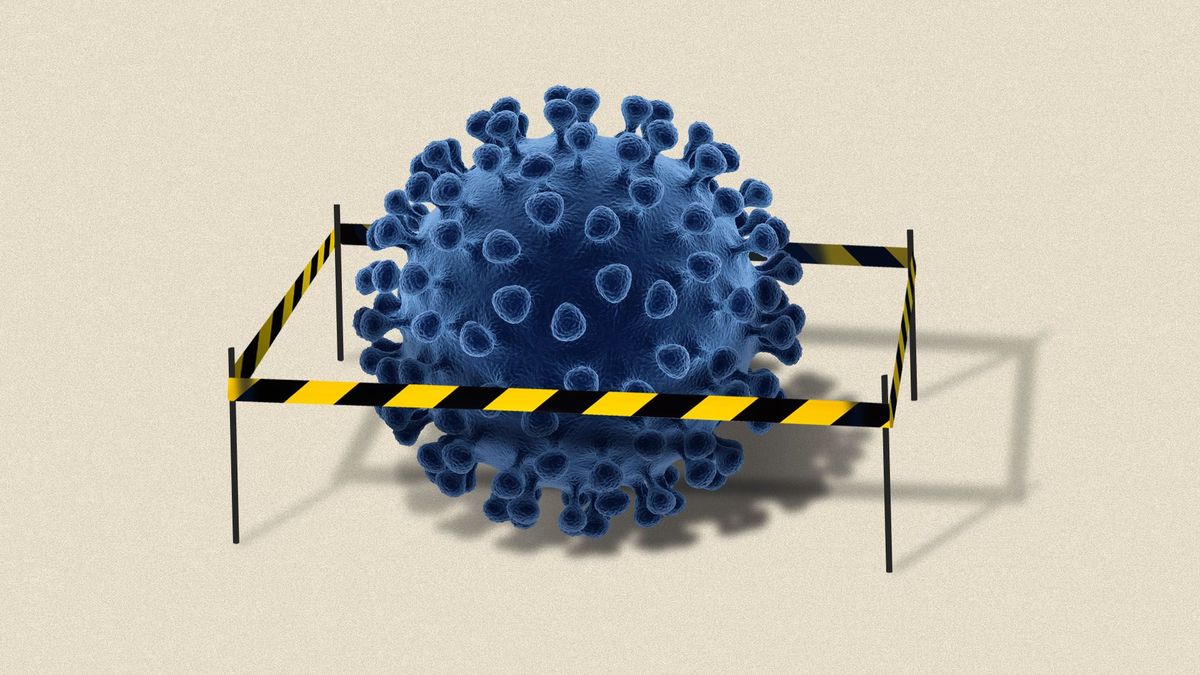
On September 9, NCUIH submitted comments to the Centers for Medicare and Medicaid Services (CMS) on its Outpatient Prospective Payment System (OPPS) Proposed Rule, specifically regarding Medicaid clinic services four walls exceptions and All-Inclusive Rate add-on payment for high-cost drugs provided by IHS and Tribal outpatient facilities.
On September 6, NCUIH submitted comments to IHS in response its joint Tribal Consultation and Urban Confer on Health IT (HIT) modernization multi-tenant domain considerations
- Go deeper: NCUIH recommended that IHS support the unique interoperability needs of UIOs and ensure security of patient health information. NCUIH also recommended that IHS address the challenges and risks that UIOs may face when transitioning EHRs.
On September 5, NCUIH submitted comments to HHS Office of the Assistant Secretary for Health (OASH) regarding the syphilis and congenital syphilis outbreak in Indian Country.
- Go deeper: NCUIH recommended that HHS and the National Syphilis and Congenital Syphilis Syndemic Federal Task Force work with UIOs as part of their strategy and continue to seek Tribal feedback.
Upcoming Federal Agency Comment Opportunity
October 1 – United States Department of Agriculture (USDA) Dietary Guidelines for America
- USDA is seeking public comment as the 2025 Dietary Guidelines Advisory Committee conducts its scientific review process. Learn more here.
Legislative Updates: 100% FMAP for UIOs, SDPI, Telehealth Modernization, and MMIP

Recent update on 100% Federal Medical Assistance Percentage (FMAP) for UIO Medicaid Services:
Next Steps:
- NCUIH remains focused on having the Urban Indian Health Parity Act (H.R. 6533) included in any lame duck legislation (the period between the November election and the start of the new Congress).
What UIOs Can Do:
- If UIOs would like to write a letter or meet with their Member of Congress to support this legislation, NCUIH is available to assist. Email policy@ncuih.org.
- We also are looking for Tribal letters of support. Please reach out to policy@ncuih.org if you know of any Tribes that would be willing to send a letter.
Special Diabetes Program for Indians (SDPI) Update
The Special Diabetes Program for Indians was reauthorized in the March 2024 Consolidated Appropriations Act through December 31, 2024. The total funding for the 2024 calendar year was $158 million, which marked the first increase for the program since 2002. Congress must pass legislation to reauthorize and appropriate funding for the program for it to continue into FY 2025 and beyond.
NCUIH continues to advocate to Congressional leadership to ensure reauthorization of this critical program in any end of year funding package.
What UIOs Can Do:
- If UIOs would like to write a letter or meet with their Member of Congress to support this program, NCUIH is available to assist. Email policy@ncuih.org.
Telehealth Modernization Act (H.R. 7623)
On September 18, 2024, the Energy and Commerce full committee passed out of markup the Telehealth Modernization Act of 2024 (H.R. 7623).
- This bill permanently extends telehealth flexibilities for Medicare beneficiaries and extends these flexibilities to federally qualified health centers and rural health clinics.
- The bill awaits further passage in the House and has not received any action in the Senate.
BADGES for Native Communities Act (S. 465)
On September 25, 2024, the Senate Committee on Indian Affairs passed out of committee the Bridging Agency Data Gaps and Ensuring Safety (BADGES) for Native Communities Act.
- This bill requires law enforcement agencies to report on cases of missing or murdered Native people.
- The bill now awaits further consideration from the Senate.
Recent Tribal Leader Letters and Dear Urban Leader Letters, Federal Tribal Advisory Committee Meetings

Recent Dear Tribal and Urban Leader Letters (DTLL/DULL)
September 10 DTLL – IHS Tribal Consultation on Contract Support Costs (CSC) Methodology for Program Income
- IHS is initiating Tribal Consultation to seek and obtain Tribes’ recommendations on funding methodologies for the payment of eligible CSCs incurred by Tribes and Tribal Organizations related to expenditures of program income.
- There will be a total of five Tribal consultation sessions in September and October. Future Sessions:
- Written comments are due by October 11, 2024, and can be emailed to consultation@ihs.gov with the subject line: CSC Methodology for Program Income.
- This letter also provides an update on the Agency’s ongoing efforts that the IHS has taken to implement the United States Supreme Court’s decision in Becerra v. San Carlos Apache Tribe.
September 4 DTLL – HHS Tribal Data Access Policy Consultation
- HHS is hosting Tribal Consultation on the Draft HHS Tribal Epidemiology Center Data Access Policy and Draft HHS Tribal Data Access Policy, to provide updates on the policies, and make them aware that the Tribal Data Access Website is now live.
- Tribal Consultation will take place Tuesday, October 1, 2024, 3:00 p.m.-5:00 p.m. ET via Zoom. Register here.
- Written comments are due by October 31, 2024, and can be emailed to consultation@hhs.gov with the subject line (please separate your comments by each draft): HHS Tribal Data Access Policy or HHS TEC Data Access Policy.
Important Events
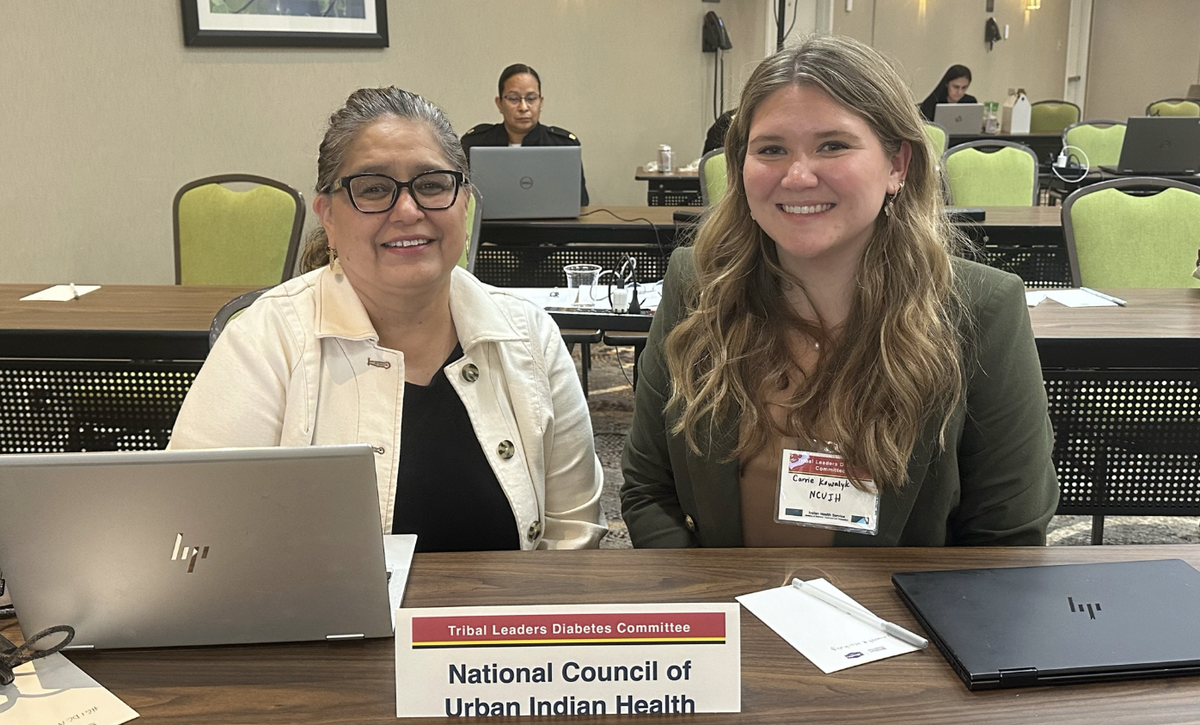
At the Tribal Leaders Diabetes Committee (TLDC) meeting: NCUIH Senior Policy Analyst Carolyn Kowalyk, staffed NCUIH Board Treasurer Adrianne Maddux, who serves as NCUIH’s Technical Advisor for TLDC.
September 17-18: IHS Tribal Leaders Diabetes Committee (TLDC) Quarterly Meeting in Washington, D.C.
- What was said: A discussion was held on how to disperse the rest of the $43 million of SDPI unobligated funds. The Committee agreed that an “administrative” supplement for eligible programs over the next two years would be ideal. IHS announced that there will be a comment period on this decision when a DTLL/DULL is released at the end of September.
- What’s next: A Tribal Consultation and Urban Confer will be held this fall and the comments will be compiled and presented at the next quarterly TLDC meeting in December.
September 10-12: HHS Secretary’s Tribal Advisory Committee (STAC) Meeting
- What was said: HHS submitted its proposed FY26 budget to Office of Management and Budget (OMB). FY26 Budget planning is now paused, HHS will adjust for new the administration.
- HHS is taking steps to carry out Executive Order (EO) 14112: Reforming Federal Funding and Support for Tribal Nations. HHS is awaiting OMB to issue a funding needs assessment to guide the agency in ensuring federal notice of funding opportunities are developed in a manner consistent with EO 14112.
- CMS is actively working on approving Medicaid demonstration requests for Traditional Healing reimbursement from four states (AZ, CA, OR, NM). CMS anticipates positive news soon.
NCUIH in Action
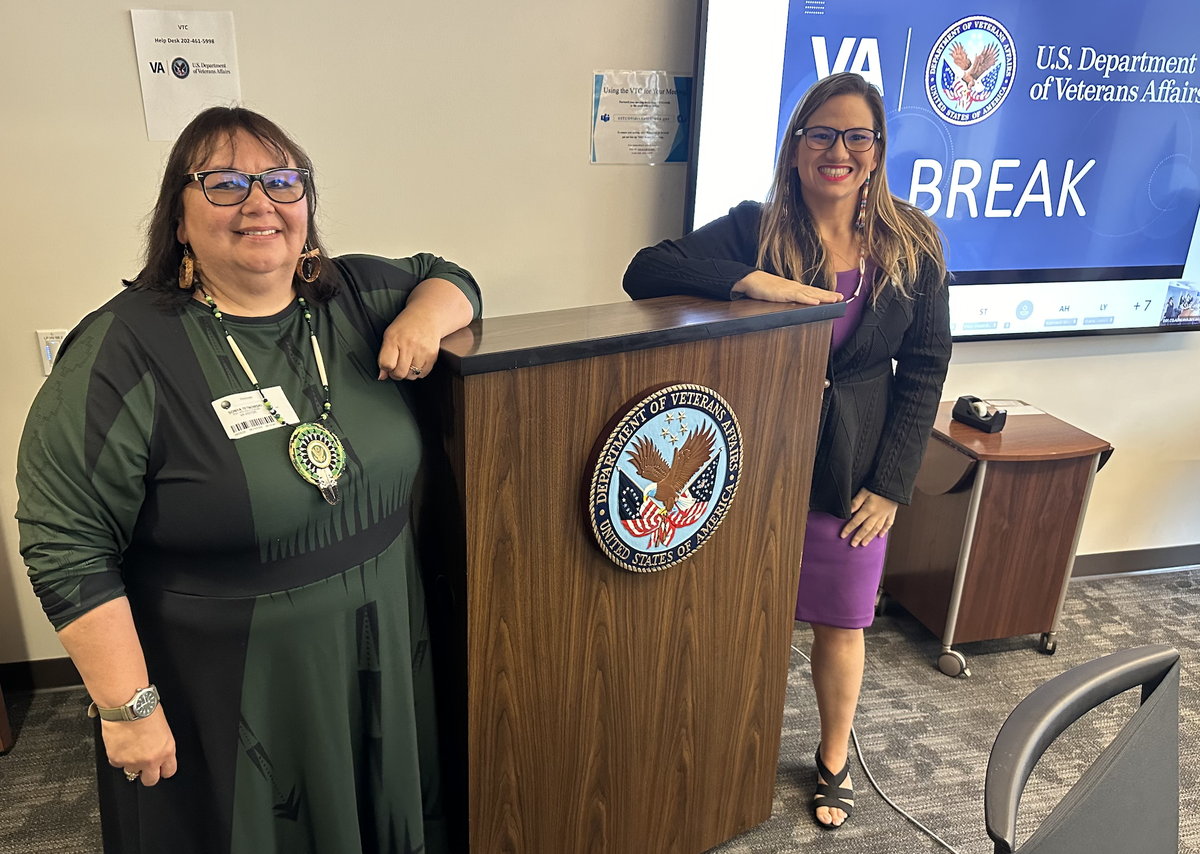
NCUIH CEO Francys Crevier (Algonquin) and Indian Health Center of Santa Clara Valley CEO and Chair of the Health Subcommittee for the VA Advisory Committee on Tribal and Indian Affairs Sonya Tetnowski (Makah).
On September 24, NCUIH CEO Francys Crevier (Algonquin) presented on the Veteran Affairs Advisory Committee on Tribal and Indian Affairs Panel, emphasizing the urgent need to address the health disparities faced by urban Native veterans. She called for improved housing resources, better care coordination between UIOs and the VA, and expanded technical assistance for Urban Indian Organizations. Crevier also acknowledged the critical leadership of Sonya Tetnowski, Army Veteran and former NCUIH Board President, who continues to champion Native Veteran voices in her role as Chair of the Advisory Committee’s Health Subcommittee.

NCUIH Vice President of Policy and Communications Meredith Raimondi and 46th President of the United States, Joseph R. Biden.
On September 12 – NCUIH represented UIOs at the White House event commemorating the 30th anniversary of the Violence Against Women Act (VAWA). This landmark legislation has made strides in protecting Native women and girls, and NCUIH is proud to have contributed to the VAWA reauthorization, ensuring urban Native communities are included in these vital protections. Our work continues to focus on culturally specific services, housing protections, and survivor-centered care.

NCUIH Public Policy Associate Chelsea Gutierrez and NCUIH Policy Analyst Emily Larsen.
On September 17, NCUIH provided support at the “Frybread for the Future” event at Native Health Phoenix UIO for National Voter Registration Day to emphasize the importance of the Native vote in the 2024 election.

NCUIH Interim Congressional Relations Director Jeremy Grabiner, Rep. Mike Quigley (D-IL-5), and AIHSC Staff.
On September 5, Rep. Mike Quigley (D-IL-5) visited the American Indian Health Service of Chicago (AIHSC). Rep. Quigley was able to tour the facility and talk to staff about the essential health care they are providing to Native communities in Illinois.
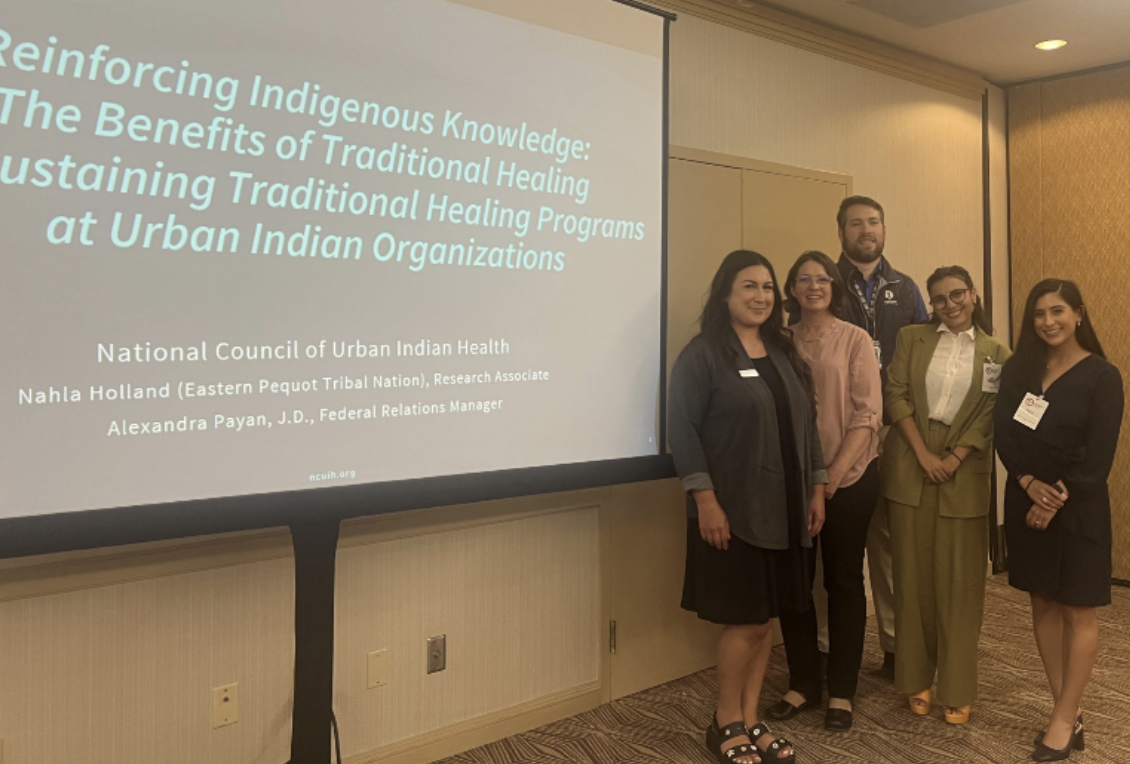
NCUIH Research Associate Nahla Holland (Eastern Pequot Tribal Nation) and NCUIH Federal Relations Manager Alexandra Payan alongside Association of American Indian Physicians Representatives.
On September 5-8, NCUIH presented its reports on UIO Traditional Healing and food programs at the Association of American Indian Physicians Conference.
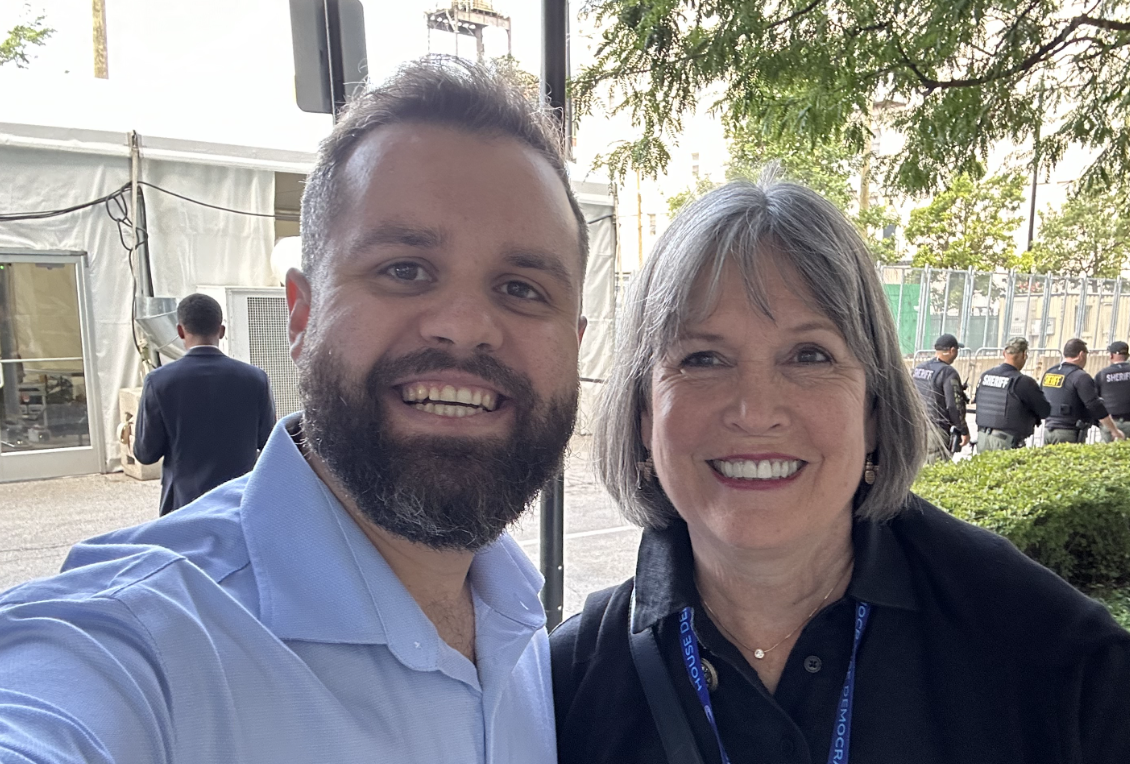
NCUIH Interim Congressional Relations Director Jeremy Grabiner and NAC Chair Emeritus Betty McCollum (D-MN-4).
On August 21, NCUIH represented UIOs at a meeting on the voter landscape & discussed UIO issues with Native American Caucus Chair Emeritus Betty McCollum (D-MN-4).
Upcoming Events and Important Dates

- October 1: HHS Tribal Data Access Policy Consultation
- October 9: CMS Tribal Technical Advisory Group (TTAG) Conference Call
- October 9: FY 2027 National Tribal Budget Formulation Process & Area Instructions Webinar
Monitoring the Bench: Becerra v. San Carlos Apache
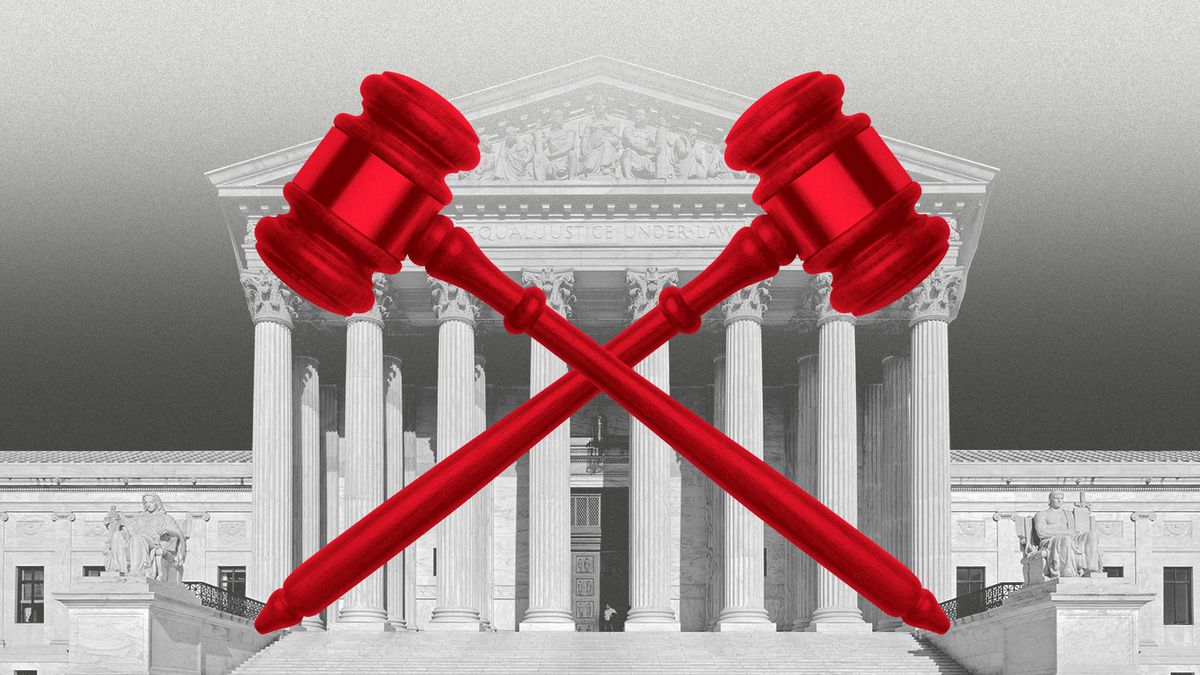
Following the decision in Becerra v. San Carlos Apache, several cases calculating contract support costs (CSCs) have been granted motions to stay. These rulings will pause the cases, preventing the Supreme Court ruling from going into effect while IHS works on their methodology for CSCs. In July and August of this year, the IHS CSCs workgroup met to discuss possible methodologies.
What’s Next: IHS plans to conduct a national consultation before adopting the methodology.
Resource: NCUIH created an FAQ on the Supreme Court decision.
Thank you, Chandos Culleen!

We extend our deepest gratitude to Chandos Culleen, JD, NCUIH Senior Director of Federal Relations, for his invaluable contributions to advancing the health and well-being of Native people. We wish him all the best!